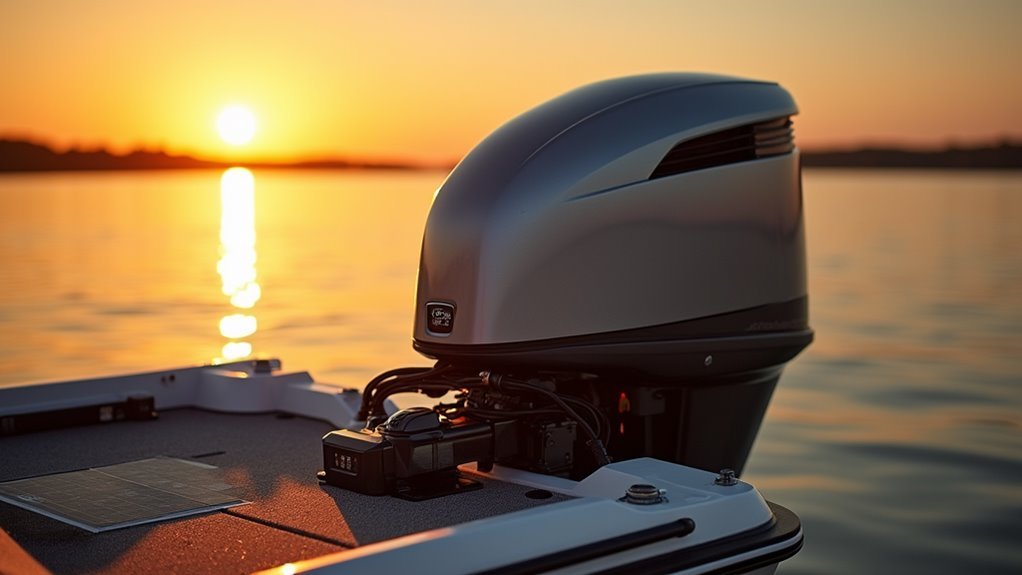We're seeing a wave of innovation in eco-friendly boating, and electric motors are leading the charge. These cutting-edge solutions aren't just about reducing our carbon footprint – they're transforming how we experience time on the water. From whisper-quiet operations that protect marine life to advanced power management systems that maximize efficiency, today's electric boat motors offer features we couldn't have imagined a decade ago. Let's explore the top five options that are making waves in sustainable maritime travel.
Zero-Emission Performance and Carbon Footprint Reduction
As we navigate toward a more sustainable future, electric boat motors are leading the charge in revolutionizing marine transportation.
We're seeing a dramatic shift in eco-friendly boating as these innovative motors deliver zero emissions, eliminating harmful pollutants that typically plague our waterways and air.
When we switch to electric propulsion, we're not just choosing a cleaner ride – we're greatly reducing our carbon footprint on the water.
Today's high-capacity lithium-ion batteries provide reliable power while being more recyclable than ever.
What's even more exciting is that we can now integrate solar panels into our boats, creating a truly sustainable power source.
With electric motors operating up to 10 times more efficiently at lower speeds, we're looking at a future where marine recreation doesn't come at the environment's expense.
Noise-Free Operation for Marine Wildlife Protection
While traditional boat engines roar through our waterways, electric motors offer a peaceful alternative that's revolutionizing marine wildlife protection. We're seeing amazing benefits of noise-free operation, with sound levels dropping from 100dB to as low as 30dB. Our marine life can now communicate and navigate freely without disruption.
| Feature | Gas Engine | Electric Motor |
|---|---|---|
| Noise Level | 100+ dB | 30-60 dB |
| Wildlife Impact | High Stress | Minimal Stress |
| Communication | Disrupts | Preserves |
| Observation | Limited | Enhanced |
| Maintenance | Frequent | Minimal |
Let's embrace this quiet revolution in boating experience! With electric boats, we're not just enjoying the water – we're protecting our aquatic ecosystems. The minimal maintenance and environmental protection we get from electric motors make them perfect for nature lovers who want freedom on the water without harming marine habitats.
Energy-Efficient Design and Power Management

Beyond their quiet operation, electric boat motors excel in the domain of energy management. Motors provide up to 10 times more efficiency than traditional engines at lower speeds, letting us maximize our time on the water.
We're seeing amazing advances in battery capacity, with today's electric boats capable of cruising over 200 nautical miles on a single charge.
Advanced technology makes power management easier than ever. The latest charging options include detachable batteries for simple swapping and solar panel integration for extended trips.
We can track our energy efficiency in real-time through remote monitoring systems, ensuring we get the most from every charge.
Whether you're planning a short cruise or a long journey, these energy-smart features help us embrace the freedom of sustainable boating without compromise.
Sustainable Materials and Manufacturing Processes
Three key innovations in sustainable materials are revolutionizing how we build electric boat motors today. We're seeing manufacturers of electric boats embrace recyclable aluminum and eco-friendly composites that reduce environmental impact while maintaining performance. Energy-efficient technologies in production mean we're creating cleaner, greener electric motors from start to finish.
| Material Type | Environmental Benefit | Impact on Performance |
|---|---|---|
| Aerospace Grade | Highly Recyclable | Enhanced Durability |
| Lithium-ion | Less Toxic Materials | Improved Efficiency |
| Eco Composites | Reduced Waste | Lighter Weight |
| Recycled Aluminum | Resource Conservation | Strong Structure |
| Smart Polymers | Reusable Components | Extended Lifespan |
The future's looking bright with closed-loop manufacturing processes that let us reuse and recycle components. We're particularly excited about new lithium-ion batteries that combine eco-friendly materials with improved recyclability.
Water Quality Preservation and Ecosystem Impact

As electric motors revolutionize the boating industry, we're seeing remarkable benefits for water quality and marine ecosystems.
When we switch to eco-friendly boating solutions, we're doing more than just reducing our carbon footprint – we're actively protecting our waterways for future generations.
The silent operation of electric motors means we can explore without disrupting marine life's natural behaviors and communication.
There's no more worry about fuel leaks or toxic bilge water harming delicate underwater habitats.
With zero emissions, we're keeping our lakes, rivers, and oceans cleaner while supporting essential conservation efforts.
We're entering an exciting era where our love for boating aligns perfectly with environmental stewardship.
Frequently Asked Questions
What Is the Most Efficient Marine Electric Motor?
We're seeing 90% efficiency in today's top marine propulsion technologies, particularly in motors that optimize battery efficiency, torque, and weight distribution while maintaining low noise levels around 30-60 dB.
Are Electric Motors Eco Friendly?
With up to 10 times greater efficiency than gas engines, we're seeing electric motors deliver exceptional eco-friendly benefits through zero emissions, whisper-quiet operation, and sustainable power that's revolutionizing how we move across water.
Are Electric Boats Eco Friendly?
We're seeing electric boats deliver major sustainability benefits with minimal environmental impact. When paired with clean energy sources and advanced battery technology, they're offering superior performance while reducing our ecological footprint on the water.
How Big of an Electric Motor Do I Need for My Boat?
Let's help you calculate motor size based on your boat's weight, speed needs, and hull design. We'll need 1 HP per 250 lbs, plus factor in your usage patterns and battery requirements.